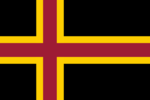Saxon Empire
This article refers to a micronation or element of micronationalism which is defunct and no longer exists. You can help make the article reflect that or ask on the talk page for further information. |
Saxon Empire Saxeneraiçh | |||||||||
|---|---|---|---|---|---|---|---|---|---|
|
Flag | |||||||||
| Official languages | Anglo-Saxon | ||||||||
| Demonym(s) | Saxon | ||||||||
| Government | Constitutional monarchy with a parliamentary system | ||||||||
• Emperor | Johannes | ||||||||
| Establishment | 18 January 2012 (formation) 1 March 2013 (into New Israel) 31 May 2018 (re-establishment) | ||||||||
| |||||||||
The Saxon Empire is a planned confederation of nations. It was previously a self-governing imperial circle of the Holy Empire of New Israel. Before its accession to New Israel, most of its constituent states became inactive or left the Empire. Eventually, the Saxon Empire became an empire in name only, lacking an organised government, territory; and simply existing as a dormant state within the Holy Empire of New Israel, with the emperor of New Israel as its monarch. On February 21, 2018, more than six years after its creation, it was dissolved by Markus Pius, Grand Inquisitor of New Israel, and the imperial title of Saxony was abolished. It was re-established on 31 May 2018.
History
Pre-New Israel
The concept of a Saxon Empire began as an idea of King Penda II, the King of West Germania, out of Germanic nationalism. West Germania was a Nemkhav state, but its cultural ambition and conservative policies were increasingly incompatible with the changeable federation ruled by a Communist coalition with liberal values and especially because of a primary Nemkhav national identity separate to the West Germanic one. Nemkhavia was, however, an ideal community and West Germanic politicians supported Marka Mejakhansk, Samuel Azehtyla and Lucas Mello in particular. An alternative long-term option was a union with Valnor. The third state to become involved was Vian, the nation of Nemkhav president Samuel Azehtyla, when he proposed leaving Nemkhavia. Valnor eventually withdrew from negotiations, leaving King Penda II and Samuel Azehtyla (Duke Sighere) as founders and co-emperors. Vian became Stonland as part of its transition to a culturally Germanic nation.
Factors leading to West Germanic nationalism include the so-called 'domino effect' with the departures of Berin, Pristinia and Koss, with which West Germania had a good relationship and the changeability of the Federation: the Conservative Party was weakened considerably by the growth of the Vanguard for Freedom, Marka Mejakhansk's resignation and the loss of Yurtyzstan's vote, leaving the hard-line Germanic state with little hope of political expansion. At the time of West Germania's withdrawal, Nemkhavia was becoming an increasingly left-wing-aligned nation and attitudes towards drugs are an example of one of the key frustrations. Discussions with Harshvardhan (Aryavart Empire) about restoration of Indo-European tradition and fellow Germanicist King Sweyn (Kingdom of Theodia) accelerated the development of the new empire. In the weeks of preparation for his withdrawal from Nemkhavia, King Penda defined his ideology in the Shepherds of the Nation party, outlining a more authoritarian, pro-state government and cultural renewal. He also pledged to support the Crannist movement started by Domanglian Darkovar Neconstantianeski and began to voice his sometimes controversial political views more among other micronations. The Church of the North played a role in the foundation of the Empire, with both Penda and Sighere upholding the Norse Dual Faith and helping the unification of Stonland and West Germania. Later on, Iskwania would join. However, on the 4th of June, 2012, Stonland left the Empire to join St.Charlie, appointing Alexis Quinn as his successor. Two months later, two new nations joined the Saxon Empire, one of them being the Kingdom of Domanglia, which replaced King Urokah's other nation, the United Principality. On 27 August 2012 Iskwania willingly annexed into the Saxon Empire to become the Colony of East Germania. Domaglia later left after a national vote declared independence of the Empire. On September 8, 2012, West Danland joined the Empire after the UBS was dissolved, but left 4 days later to merge with the former Slin department of East Danland to form the Provisional Government of Danland, which itself became part of Daniel-Land, the following month.
Within the Holy Empire
Due to the loss of many initially enthusiastic constituent states, the Saxon Empire never quite recovered, even after becoming a founding state within the Holy Empire of New Israel. During the Second Spice War, the Saxon Empire seceded from New Israel, and was successful in preserving this secession; but over a year later, it returned to the fold. After New Israel's emperor converted to Catholicism, Saxony attempted to secede again, but this was settled in the Second 10 January Accords, signed 10 January 2016, wherein Saxony's remaining constituent states (Saxmark and few others)) left, leaving the Saxon Empire, with no territory, but with its imperial title, in the hands of Emperor Markus of New Israel.
Dissolution
...[T]herefore we abdicate, invalidate, abolish, and annul the office of the Saxon emperor, and dissolve the Saxon empire and all of its government, henceforth and forever...
— Markus Pius, Decree on the Dissolution of the Saxon Empire[1]
After two years of no development, the Saxon Empire was finally dissolved, in keeping with the New Israeli policy of rejecting the title of "emperor" if said person has no sanction from the Catholic Church.
